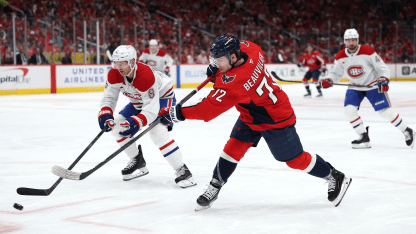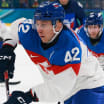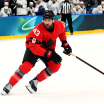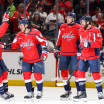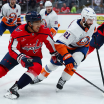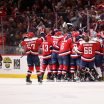The Killer Instinct – Sunday night in Montreal, the Caps stymied the Canadiens at 5-on-5 and engineered a third-period comeback to earn a 5-2 victory in Game 4 of their first-round Stanley Cup playoff series with the Montreal Canadiens. Sunday’s win gives Washington a 3-1 lead in the tightly contested series, and a chance to close out a playoff series on home ice for the first time in just over a decade.
Tonight’s Game 5 is the Caps’ first opportunity to close out this series, and they’d prefer to get it done in front of a home crowd that’s hungry to see that happen; it’s been a decade and three days (2-1 win in Game 7 on April 27, 2015 vs. NY Islanders) since the District hockey faithful has seen the post-series handshake line here at 6th and F Sts.
As we all know, the fourth win of the best-of-seven set is the hardest one to nail down. The Caps have seen enough of the Canadiens at their best to know that Montreal will deliver its best game of the series tonight, and the Caps are going to need to match their fire, their desperation and their intensity tonight.
“I think that the start of the game is going to be important from an overall standpoint of what you expect from the Montreal Canadiens,” says Caps coach Spencer Carbery. “I feel like they’ve said it a lot over the last couple of months; they’ve been playing in do or die situations since the 4 Nations [tournament in February]. So they’re going to be very comfortable in this environment and facing elimination; it’s sort of the same they were, even watching their games down the stretch.
“You can tell they’ve been through it. So like I said Tuesday, we expect their best punch today, and we’re going to need to be ready and we’re going to have our best tonight.”
“Doc Rivers once said, ‘The series doesn’t start until someone loses at home,’ and that’s finally happened,” says Caps center P-L Dubois. “So it’s our turn to win at home next game, and close this out. You never want it to drag [out]. Obviously, they’re probably going to be playing their best game of the season; they don’t want to go back home empty-handed.
“For us, it’s going to be about preparing. [Tuesday], we had a good practice; [Wednesday] we’ll have good meetings and we’ll be ready to go.”
All Of This And Nothing – In a tightly contested series in which the Caps and Habs have been tied or within a goal of one another for 88 percent of the first four games, every goal matters. And at this time of year, it’s worth remembering that goals scored are every bit as valuable as goals prevented, especially when your opponent features one of the League’s most elite and dangerous forward lines.
During the ‘24-25 campaign, Washington’s forward trio of Connor McMichael, Dubois and Tom Wilson combined to score 79 goals, and all three players piled up at least 57 points. Over the course of the 82-game regular season, the trio skated 398:18 together as a unit, more than any combination of any three Washington forwards, according to naturalstattrick.com. Dubois and his linemates outscored the opposition by 27-23 in that chunk of regular season minutes together.
In this series against Montreal, Carbery has tasked the Dubois line with going up against the Canadiens’ top line of Cole Caufield, Nick Suzuki and Juraj Slafkovsky. During the regular season, only two lines in the NHL played more minutes together than the 705:58 logged by the Suzuki unit, which outscored its opponents by a lopsided 50-29 at 5-on-5 during the regular season.
“I think their role and that line is going to fly under the radar a little bit in this series, because if you look at just the stat pack, it's not going to tell the story,” says Carbery of the Dubois line. “And that's unfortunate, because as a coach, I'm the one putting them in these difficult situations and the starts, and the assignments, and the matchups. And you hope the outside world can see that, and it’s why I appreciate – and we’ve talked about it all year – guys having great individual years. It's why I think there's so much value in that, because it shows and solidifies all the work and the detail that they’ve put into our team winning, and it's the individual achievement of them being rewarded for it.”
In home games in which Carbery controls the matchup, he has largely deployed the Dubois line against Suzuki and company. But because Montreal’s youthful and talented trio sometimes skates extended shifts in the offensive zone, and because they tend to eat up more overall minutes than most top trios around the League, Carbery has had to share those shutdown duties between the Dubois and the Nic Dowd lines, and he obviously doesn’t have the ability to control the matchups for road games.
In Game 1 of the series in Washington, Suzuki scored the game’s tying goal in the third period, doing so while going up against Dowd, McMichael and Wilson. It was Montreal’s only 5-on-5 goal in the game; the Habs also only scored one goal at 5-on-5 in Game 2 here in Washington, and that one came from Christian Dvorak.
When the series moved north to Montreal last weekend, the Habs opened a six-pack on the Caps in a 6-3 win. Each member of the Canadiens’ top trio scored in last Friday’s Game 3, with Suzuki scoring on the power play and the other two scoring at 5-on-5. Four of Montreal’s goals that night came at 5-on-5, and all four were scored within 10 seconds of a Washington turnover. The Suzuki line had their way with Washington in that game, combining for 19 shots on net, 25 shot attempts, plus the three goals and an assist.
Without being able to control the matchups, it was a tough night for the Caps. Montreal coach Martin St. Louis had the Dvorak line – with Josh Anderson and Brendan Gallagher – out against the Dubois line a lot in the two games in Montreal, which changed everything.
“I think situationally, we have to be very aware of every time we go on the ice what's going on,” says Wilson. “And we have to be focused and knowing our game and being able to depend on our game that we've built all season long to be a dependable line that can chip in when we get looks. The first couple games was primarily a shutdown role. And then you go to Montreal [for Games 3 and 4], and they're bouncing between two lines playing against us, their top line and their checking line, so that creates a whole another element.
“When you hop over the boards, you don't know whether you're getting three skilled guys or three guys that are going to run around. And you’ve got to depend on your experience a little bit to feel out the game and what's needed in those different situations. I think as a line, we have a center man in Dubie that you can depend on in any area of the rink, whether it's [defensive] zone, [offensive] zone, or whatever, he is just a high IQ player. He's strong on the puck he can make things happen. So, we're comfortable playing whichever game, which at this time of year I think is important.”
Two nights later in a 5-2 victory in Game 4, Slafkovsky and Caufield supplied Montreal’s offense with a pair of goals, but both were scored on the power play; the Habs were held to just a dozen shots on net all night at 5-on-5, with exactly one of those – a Suzuki shot late in the first period – coming from the top Montreal line.
“There are ups and downs,” says Dubois of the playoffs. “And even in that game [Game 3], we had some good moments and some low moments, too. Whenever you take six or seven penalties, it’s tough. For the guys who are killing, they come back tired and the guys who don’t kill, they’re out of the game and it takes a few shifts to get back in. It’s not an ideal situation, but we’ve been through it all year. We know that there are going to be games like that in the playoffs, and there’s nothing you can do about it.
“And we stayed in the game, and we had a chance to win until the end, and that’s the positive. Although we made some mistakes and didn’t play our best game, we were still in it. We learned from that in Game 4, and I think we kept our emotions more in check. We made better decisions, and we made better decisions with the puck, and we knew what [the Canadiens] were going to do. I think that was the biggest difference of Game 4 from Game 3.”
Well, that and the excellent work Washington did to limit the Habs at 5-on-5 in that contest, and doing so without the benefit of controlling the matchups.
In addition to racking up a nearly a goal a game (all strengths) during the regular season, the Dubois trio was sometimes tasked with neutralizing the opposition’s top line, a responsibility they embraced and at which they excelled. Despite getting just 47.81 percent of their starts together as a line in the offensive zone, the Dubois line had an expected goals for rate of 54.3 percent during the regular season, ranking 11th best among the 41 forward lines in the NHL that skated as much as 275 minutes together.
Four games into this series with Montreal, Dubois and linemates have been on the clock together for 38:19, again the most of any Washington forward trio. And in this series, they’ve taken a much lower percentage (35.29 percent) of face-offs in the offensive zone than they were accustomed to taking in the regular season.
During the first four games of the series, the Suzuki line has logged over 52 minutes together at 5-on-5, and they’ve controlled a gaudy 65.1 percent of the shot attempts during that span. Dubois’ line hasn’t been against them for all of those minutes obviously, but the Dubois line is way underwater in controlling shot attempts, with just 37.21 percent.
Despite controlling only about a third of shot attempts and taking far more defensive zone draws than in the regular season, the Dubois line has an expected goals percentage of 58.1 percent in the series, a remarkable figure given that line’s heavy defensive deployment.
“So as that line goes through [the playoffs], obviously Mikey has been rewarded on the scoresheet with his three goals, and Dubie, I think he’s got an assist,” says Carbery. “But I think they’re playing at a really high level, in getting out-attempted but starting in the [defensive] zone, playing a ton against Suzuki’s line. I don’t need to go into that; it’s as tough a matchup as you can get in this League.
“They’ve been playing solid. Do we hope that they chip in offensively with another 5-on-5 goal, or a couple moving forward in the series and [Wednesday] night? Absolutely, but the foundation of what they’re doing is giving us good, rock solid, strong minutes in tough deployment. And that’s what’s going to happen [in Game 5].”
Montreal has scored 11 goals in the series to date, with the Suzuki line combining to score seven goals in the first four games. But with the Dubois line against them at even strength, the Suzuki line has been even; they’ve scored one goal and have had one goal scored against them. Four of the seven goals by the Suzuki line have come on the power play.
The Suzuki line’s expected goals for rate in this series is 4.7, highest of any line in the League that has logged at least 27 minutes together in these playoffs. But they’ve only scored three goals at evens to date, with two of the three coming directly from Washington turnovers.
“I think all three of us are really proud of handling that task and having that responsibility of not only shutting down lines, but in also putting goals on the board and helping the team win in different ways,” says McMichael. “But obviously that Suzuki line is real dangerous with the puck. Anywhere around the offensive zone for them, you’ve got to keep your head on a swivel; they're making little plays everywhere.
“Dubie has been phenomenal down low, and he’s cutting off plays and breaking it up pretty easily for us so far. We’re just looking to do more of that, and to just stay connected and keep making good reads.”
All season long, Dubois, McMichael and Wilson have been playing some excellent two-way hockey in all three zones, over all 200 feet of the ice, and in arenas all over North America. The work they do in keeping skilled opponents off the scoreboard goes largely unnoticed among the casual fans and the hockey media, but it’s noticed and greatly appreciated within the walls of the room.
“I think they've done an awesome job, and that's been all year,” says Caps defenseman Trevor van Riemsdyk. “I think Dubie has been incredible in the way that we can put him out against that top line. And he's not just defending, he's carrying the puck and making offense happen. I think that's what you need, right?
“We have that [Dowd] line that can obviously shut guys down, but a guy like Dubie playing against those high-end guys, he can have the puck on his stick in the [offensive] zone and generate while they have their best guys on the ice, and that is hugely important. He's done that for us all year; he has been so good for us over all 200 feet, and he could be a Selke [Trophy] guy if you really watched us and watched why we were successful. It’s because of his ability to neutralize the other team's top six and also generate offense.”
One more thing here. With Dubois and linemates taking one for the team, so to speak, others have been able to have success. Four games into this series, the line of Alex Oveckhkin, Dylan Strome and Anthony Beauvillier has yet to take a single defensive zone draw, not one. One hundred percent of their face-offs have come in the offensive zone, and they’ve logged nearly 35 minutes together.
In fact, with four goals at 5-on-5 in as many games, that Strome line is tied for the most goals of any forward trio in the 2025 playoffs to date. The Dubois line is even, the Dowd line is minus-1 (0-1, with 10 percent offensive zone draws) and the Lars Eller line is plus-1 (1-0, with 66.67 offensive zone draws). The Strome line (4-1) has accounted for the three-goal difference between Washington and Montreal in this series (14-11).
That doesn’t happen without Dubois and his linemates eating up some difficult minutes against some highly skilled players. And that requires a mindset adjustment.
“It makes it a lot harder mentally and a lot harder physically,” says Dubois. “You’re starting 200 feet from their net, and if you lose that face-off that could be just a shift in the [defensive] zone. So if you play 20 shifts and start seven of them in the [defensive] zone, and you lose five draws, that’s a lot of shifts spent just defending.
“So it’s tough, and it makes it a lot harder to produce offensively, and it’s a lot harder physically. But in the playoffs, the goal is just to win. And if it helps the team win, you take a lot of pride in that. Playing that two-way game is a lot easier than just playing defensive, but at the end of the day, everybody has a job to do out there. If we’ve got to be taking 10 defensive-zone draws and that’s our job, then we’ve got to be doing it right. We’ve been doing a good job of that, and we’re going to keep with it.”
In The Nets – Logan Thompson starts for the fifth time in as many games in this series for Washington. After departing the hectic and chaotic Game 3 in Montreal because of an injury with less than seven minutes remaining in the game, Thompson was able to recover and was back between the pipes for the Caps in Sunday’s Game 4. He made 16 stops – including all 12 shots he faced at 5-on-5 to pick up his third win of the series and help push the Canadiens to the precipice of elimination.
With 2.6 goals saved above expected in the playoffs, Thompson ranks sixth among all goaltenders in the postseason.
Montreal’s Sam Montembeault started each of the first three games of the series, but he also departed Game 3 – midway through the second period – with an injury. Unfortunately for the Habs, Montembeault was not able to answer the bell for Game 4, so the Canadiens are now riding with rookie Jakub Dobes.
With 1.3 goals saved above expected, Montembeault ranks eighth among all playoff goaltenders. In a game and a half in the crease, Dobes is at minus-1.4 goals saved above expected, putting him 21st among the 25 goaltenders who’ve seen action in the 2025 Stanley Cup playoffs.
All Lined Up – Here’s how the Capitals and the Canadiens might look for Wednesday night’s Game 5 of the best-of-seven set between the two teams:
WASHINGTON
Forwards
8-Ovechkin, 17-Strome, 21-Protas
24-McMichael, 80-Dubois, 43-Wilson
88-Mangiapane, 20-Eller, 9-Leonard
22-Duhaime, 26-Dowd, 72-Beauvillier
Defensemen
6-Chychrun, 74-Carlson
3-Roy, 38-Sandin
27-Alexeyev, 57-van Riemsdyk
Goaltenders
48-Thompson
79-Lindgren
Extras
16-Raddysh
25-Bear
33-Stevenson
52-McIlrath
53-Frank
Out/Injured
15-Milano (upper body)
19-Backstrom (hip)
42-Fehervary (lower body)
77-Oshie (back)
MONTREAL
Forwards
13-Caufield, 14-Suzuki, 20-Slafkovsky
11-Gallagher, 28-Dvorak, 17-Anderson
15-Newhook, 71-Evans, 93-Demidov
51-Heineman, 91-Kapanen, 40-Armia
Defensemen
8-Matheson, 45-Carrier
21-Guhle, 48-Hutson
72-Xhekaj, 58-Savard
Goaltenders
75-Dobes
30-Primeau
Extras
47-Struble
55-Pezzetta
Out/Injured
31-Price (lower body)
35-Montembeault (lower body)
77-Dach (lower body)
92-Laine (upper body)

